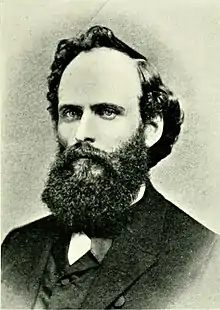Edward Payson Evans | |
|---|---|
 From Hinsdale, History of the University of Michigan | |
| Born | December 8, 1831 Remsen, New York, U.S. |
| Died | March 6, 1917 (aged 85) New York City, U.S. |
| Education | University of Michigan (BA, 1854) |
| Occupation(s) | Scholar, linguist, educator |
| Years active | 1855–1917 |
| Notable work | The Criminal Prosecution and Capital Punishment of Animals (1906) |
| Spouse |
Elizabeth Edson Gibson
(m. 1868; died 1911) |
Edward Payson Evans (December 8, 1831 – March 6, 1917) was an American scholar, linguist, educator, and early advocate for animal rights. He is best known for his 1906 book on animal trials, The Criminal Prosecution and Capital Punishment of Animals.
Biography
Evans was born in Remsen, New York, in 1831.[1] His father was the Reverend Evan Evans,[2] a Welsh Presbyterian clergyman.[3] Evans earned a Bachelor of Arts from the University of Michigan in 1854.[2] He then taught at an academy in Hernando, Mississippi, in 1855, before becoming a professor at Carroll University (then Carroll College) in Waukesha, Wisconsin from 1856 to 1857.[4]
From 1858 to 1862, he traveled abroad, studying at the universities of Göttingen, Berlin and Munich.[5] On his return to the United States, he became professor of modern languages at the University of Michigan.[5] In 1868, he married Elizabeth Edson Gibson,[6] and in 1870, Evans resigned his position at Michigan to travel abroad again, where he gathered materials for a history of German literature,[5] and made a specialty of studying oriental languages.[7]
While living in Munich, he became a fixture at the Royal Library of Munich,[8] and joined the staff of the political journal Allgemeine Zeitung in 1884.[4] Evans' wife died in 1911 and when the First World War broke out in 1914, he returned to the United States, where he lived in Cambridge, Massachusetts and New York City.[8]
Evans died at his home in New York City, on March 6, 1917.[3]
Legacy
Evans' 1906 book The Criminal Prosecution and Capital Punishment of Animals, is considered to be the seminal work on the topic of animal trials.[9] In recent years the book has been the subject of several critiques.[10]
Environmental historian Roderick Nash argues that both Evans and J. Howard Moore, "deserve more recognition than they have received as the first professional philosophers in the United States to look beyond anthropocentrism."[11]
Selected works
Articles
- "Linguistic Paleontology", The Atlantic Monthly, Vol. 53, Iss. 5, May 1884, pp. 613–622
- "Bugs and Beasts before the Law", The Atlantic Monthly, Vol. 54, Iss. 2, Aug. 1884, pp. 235–247
- "Artists and Art Life in Munich", Cosmopolitan, Vol. 9, Iss. 1, May 1890, pp. 3–13
- "Speech as a Barrier Between Man and Beast", The Atlantic Monthly, Vol. 68, Iss. 3, Sept. 1891, pp. 299–312
- "The Nearness of Animals to Men", The Atlantic Monthly, Volume 69, Iss. 2, Feb. 1892, pp. 171–184
- "Ethical Relations Between Man and Beast", Popular Science Monthly, Volume 45, Sept. 1894
Books
- Abriss der deutschen Literaturgesehichte (New York: Leypoldt & Holt, 1869)
- A Progressive German Reader: With notes and a Complete Vocabulary (New York: Holt & Williams, 1869)
- Animal Symbolism in Art and Literature (London: W. Heinemann, 1896)
- Animal Symbolism in Ecclesiastical Architecture (New York: H. Holt and Company, 1896)
- History of German Literature in (5 vols., 1898)
- Evolutional Ethics and Animal Psychology (New York: D. Appleton & Company, 1897)
- The Criminal Prosecution and Capital Punishment of Animals (London: W. Heinemann, 1906)
Translations
- Adolf Stahr, The Life and Works of Gotthold Ephraim Lessing (with an introduction; 2 vols., Boston, 1866)
- Athanase Josué Coquerel, First Historical Transformations of Christianity (1867)
References
- ↑ Heyse, Paul Johann Ludwig von (1899). "Evans, Edward P. geb. 1831 in Remsen (Staat NY), gest. 1917" [Evans, Edward P. born 1831 in Remsen (NY State), died 1917]. Das literarische München: 25 Porträtskizzen [The Literary Munich: 25 Portrait Sketches] (in German).
- 1 2 Hinsdale, B. A.; Demmon, Isaac Newton (1906). History of the University of Michigan. Ann Arbor: University of Michigan. p. 237.
- 1 2 "Edward Payson Evans Dies". The New York Times. March 8, 1917. p. 11. Retrieved January 21, 2020 – via Newspapers.com.
- 1 2 . Appletons' Cyclopædia of American Biography. 1900. p. 381.
- 1 2 3 . The American Cyclopædia. Vol. VI. 1879.
- ↑ "Evans, Elizabeth Edson". Chicago Examiner. Vol. 9, no. 230. September 15, 1911. Retrieved October 6, 2021.
- ↑ . Encyclopedia Americana. Vol. X. 1920.
- 1 2 Evans, Edward Payson; Humphrey, Nicholas (1987). "Foreword". The Criminal Prosecution and Capital Punishment of Animals. London: Faber & Faber. p. xxviii. ISBN 978-0-571-14893-6.
- ↑ Szerlip, B. Alexandra (June 25, 2021). "Animal Trials: The Quest for Order in a Chaotic World". Berfrois. Archived from the original on June 25, 2021. Retrieved October 6, 2021.
- ↑ "Commissioned Text: Aleks Pluskowski on YEAST". [ SPACE ]. September 2016. Archived from the original on May 16, 2021. Retrieved October 6, 2021.
- ↑ Nash, Roderick Frazier (1989). The Rights of Nature: A History of Environmental Ethics. Madison, Wisconsin: University of Wisconsin Press. p. 122. ISBN 978-0-299-11843-3.
External links
- Works by or about Edward Payson Evans at Internet Archive
- Works by Edward Payson Evans at Project Gutenberg
- Works by Edward Payson Evans at LibriVox (public domain audiobooks)

- "Back Home After 40 Years.; Prof. E.P. Evans Here to Complete His History of German Literature". The New York Times. December 29, 1911.